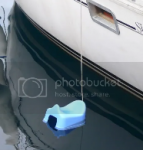thinwater
Well-Known Member
But what if you can't get them out of the water?
It's easy to say you'll get them straight into the dinghy, but suppose it proves more difficult than expected, for any one of a number of reasons?...
You go to shore... obviously. It is an assumption of this thread that it is nearby. Do you think kayakers ever take someone "aboard" when rescuing? That is the reason there is always a loop on the stern (for the swimmer to hold).
As for loosing track... it is a pretty good bet they are down current. As for pressing the MOB button, that only records where the boat is anchored, which isn't changing.

